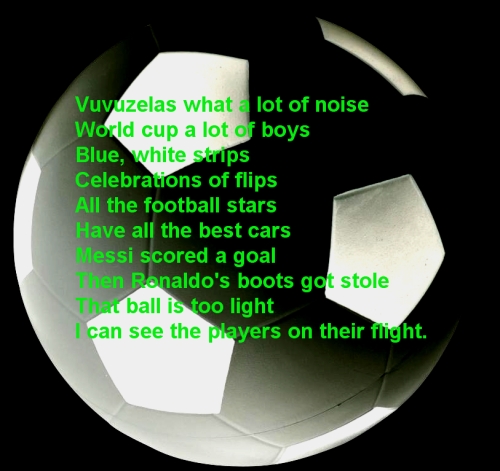Football Poems Biography
Source(google.com.pk)
Frederic Ogden Nash (August 19, 1902 – May 19, 1971) was an American poet best known for writing pithy and funny light verse. At the time of his death in 1971, the New York Times said his "droll verse with its unconventional rhymes made him the country's best-known producer of humorous poetry".
Ogden Nash was born in Rye, New York. His father owned and operated an import-export company, and because of business obligations, the family relocated often.
After graduating from St. George's School (Middletown, Rhode Island), Nash entered Harvard University in 1920, only to drop out a year later. He returned to St. George's to teach for a year and left to work his way through a series of other jobs, eventually landing a position as an editor at Doubleday publishing house, where he first began to write poetry.
Nash moved to Baltimore, Maryland, three years after marrying Frances Leonard, a Baltimore girl. He lived in Baltimore from 1934 and most of his life until his death in 1971. Nash thought of Baltimore as home. After his return from a brief move to New York, he wrote "I could not love New York had I not loved Balti-more."
His first job in New York was as a writer of the streetcar card ads for a company that previously had employed another Baltimore resident, F. Scott Fitzgerald. Nash loved to rhyme. "I think in terms of rhyme...and have since I was six years old," he professed. He had a fondness for crafting his own words whenever rhyming words did not exist.
In 1931 he published his first collection of poems, Hard Lines, earning him national recognition. Some of his poems reflected an anti-establishment feeling. For example, one verse, entitled Common Sense, asks:
Why did the Lord give us agility,
If not to evade responsibility?
When Nash wasn’t writing poems, he made guest appearances on comedy and radio shows and toured the United States and England, giving lectures at colleges and universities.
Nash was regarded respectfully by the literary establishment, and his poems were frequently anthologized even in serious collections such as Selden Rodman's 1946 A New Anthology of Modern Poetry.
Nash was the lyricist for the Broadway musical One Touch of Venus, collaborating with librettist S. J. Perelman and composer Kurt Weill. The show included the notable song "Speak Low (When You Speak Love)." He also wrote the lyrics for the 1952 revue Two's Company.
Nash and his love of the Baltimore Colts were featured in the December 13, 1968 issue of Life Magazine, with several poems about the American football team matched to full-page pictures. Entitled “My Colts, verses and reverses,” the issue includes his poems and photographs by Arthur Rickerby. “Mr. Nash, the league leading writer of light verse (Averaging better than 6.3 lines per carry), lives in Baltimore and loves the Colts” it declares. The comments further describe Nash as “a fanatic of the Baltimore Colts, and a gentleman.” Featured on the magazine cover is defensive player Dennis Gaubatz, number 53, in midair pursuit with this description: "That is he, looming 10 feet tall or taller above the Steelers' signal caller...Since Gaubatz acts like this on Sunday, I'll do my quarterbacking Monday." Memorable Colts Jimmy Orr, Billy Ray Smith, Bubba Smith, Willie Richardson, Dick Szymanski and Lou Michaels contribute to the poetry. Ironically, the number “19” marks the day of his birth and his death and the jersey of Colts quarterback Johnny Unitas.
Among his most popular writings were a series of animal verses, many of which featured his off-kilter rhyming devices. Examples include "If called by a panther / Don't anther"; "You can have my jellyfish / I'm not sellyfish"; and "The Lord in His wisdom made the fly / And then forgot to tell us why." The most frequently quoted of these poems is his ode to the llama:
The one-L lama, he's a priest
The two-L llama, he's a beast
And I would bet a silk pyjama
There isn't any three-L lllama
(Nash appended a footnote to this poem: "The author's attention has been called to a type of conflagration known as a three-alarmer. Pooh." [2]
Nash died of Crohn's disease at Johns Hopkins Hospital in Baltimore on May 19, 1971.[1] He is interred in North Hampton, New Hampshire. His daughter Isabel was married to noted photographer Fred Eberstadt, and his granddaughter, Fernanda Eberstadt, is an acclaimed author.
Bed Riddance, 1970 collection
Bed Riddance, 1970 collection
A biography, Ogden Nash: The Life and Work of America's Laureate of Light Verse, was written by Douglas M. Parker, published in 2005 and in paperback in 2007. The book was written with the cooperation of the Nash family and quotes extensively from Nash's personal correspondence as well as his poetry.
Nash was best known for surprising, pun-like rhymes, sometimes with words deliberately misspelled for comic effect, as in his retort to Dorothy Parker's dictum, Men seldom make passes/At girls who wear glasses:
A girl who is bespectacled
She may not get her nectacled
But safety pins and bassinets
Await the girl who fassinets.
He often wrote in an exaggerated verse form with pairs of lines that rhyme, but are of dissimilar length and irregular meter.
The critic Morris Bishop, when reviewing Nash's 1962 Everyone But Thee and Me, offered up this lyrical commentary on Nash's style:
Free from flashiness, free from trashiness
Is the essence of ogdenashiness.
Rich, original, rash and rational
Stands the monument ogdenational![3]
Nash's poetry was often a playful twist of an old saying or poem. He expressed this playfulness in what is perhaps his most famous rhyme. Nash observed the following in a turn of Joyce Kilmer's words "I think that I shall never see a poem lovely as a tree."
I think that I shall never see
A billboard lovely as a tree.
Perhaps, unless the billboards fall,
I'll never see a tree at all.
Similarly, in Reflections on Ice-Breaking he wrote:
Candy
Is dandy
But liquor
Is quicker.
In 1968 he added:
Pot is not.
He also commented:
I often wonder which is mine:
Tolerance, or a rubber spine?
His one-line observations are often quoted.
People who work sitting down get paid more than people who work standing up.
Progress might have been all right once, but it has gone on too long.
Football Poems Poems About Love For Kids About Life About Death About Friendship For Him About Family Tumblr For Her About Nature


Football Poems Poems About Love For Kids About Life About Death About Friendship For Him About Family Tumblr For Her About Nature
Football Poems Poems About Love For Kids About Life About Death About Friendship For Him About Family Tumblr For Her About Nature


Football Poems Poems About Love For Kids About Life About Death About Friendship For Him About Family Tumblr For Her About Nature


Football Poems Poems About Love For Kids About Life About Death About Friendship For Him About Family Tumblr For Her About Nature


Football Poems Poems About Love For Kids About Life About Death About Friendship For Him About Family Tumblr For Her About Nature


Football Poems Poems About Love For Kids About Life About Death About Friendship For Him About Family Tumblr For Her About Nature


Football Poems Poems About Love For Kids About Life About Death About Friendship For Him About Family Tumblr For Her About Nature


Football Poems Poems About Love For Kids About Life About Death About Friendship For Him About Family Tumblr For Her About Nature


Football Poems Poems About Love For Kids About Life About Death About Friendship For Him About Family Tumblr For Her About Nature


Football Poems Poems About Love For Kids About Life About Death About Friendship For Him About Family Tumblr For Her About Nature
.jpg)
.jpg)
Football Poems Poems About Love For Kids About Life About Death About Friendship For Him About Family Tumblr For Her About Nature


Football Poems Poems About Love For Kids About Life About Death About Friendship For Him About Family Tumblr For Her About Nature
.jpg)
.jpg)
Football Poems Poems About Love For Kids About Life About Death About Friendship For Him About Family Tumblr For Her About Nature
.jpg) Football Poems Poems About Love For Kids About Life About Death About Friendship For Him About Family Tumblr For Her About Nature
Football Poems Poems About Love For Kids About Life About Death About Friendship For Him About Family Tumblr For Her About Nature
.jpg)
No comments:
Post a Comment